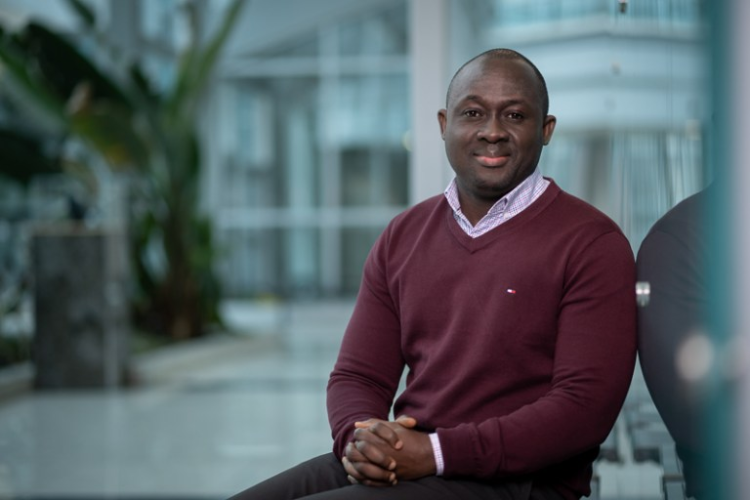For his research contributions to HIV vulnerability, a member of the Faculty of Humanities and Social Sciences has been named a fellow of the African Academy of Sciences, representing the classes of 2023-24.

The Faculty of Humanities and Social Sciences' Dr. Eric Tenkorang has been named a fellow of the African Academy of Sciences. Photo: Rich Blenkinsopp
Fellowship in the academy is a prestigious honour, awarded through a rigorous, merit-based process to scholars who have made significant contributions to science, technology and scholarship in Africa and around the world.
"The problems we are working to solve are not unique to Africa," said Dr. Eric Tenkorang, a professor in the Department of Sociology at Memorial University. "They are global."
For his contributions, Dr. Tenkorang has received other prestigious awards, including the Harry Frank Guggenheim Distinguished Scholar Award. He is also a member of the Royal Society of Canada's College of New Scholars, Artists and Scientists.
The call
Dr. Tenkorang's research journey began as an undergraduate student in Ghana when a close friend contracted HIV.
While visiting them in the hospital, he was confronted not only with his friend's suffering but with the broader realities of the HIV and AIDS pandemic.
"For me, it's beyond a professional call. It's also a moral call." Dr. Eric Tenkorang
He vowed to dedicate his life to uncovering the social and structural conditions that predispose people to infection.
"The HIV/AIDS pandemic has been written about, but my work is about examining it from a sociocultural angle. For me, it's beyond a professional call. It's also a moral call."
Early in his research, Dr. Tenkorang uncovered a recurring pattern linking HIV infection and women who have experienced intimate partner violence.
"I realized that we couldn't tell the story of HIV without also telling the story of sexual violence," he said, "because they are so interconnected."
Researching vulnerability
As he continued to pull the sociocultural threads that shape HIV vulnerability, Dr. Tenkorang's research expanded to include factors not traditionally associated with HIV.
With support from a Social Sciences and Humanities Research Council Insight Grant, he has been investigating the little-explored links between HIV, intimate partner violence and food insecurity.
"When I talk to my study participants, the message I give them is that there are always solutions." Dr. Eric Tenkorang
While the relationship between food insecurity and intimate partner violence has been documented, the specific vulnerabilities of persons living with HIV, who are among the most food-insecure populations globally, have not received the same attention.
"You'd think there'd be a lot of research, but there isn't," he said.
Dr. Tenkorang is also studying how mobile financial technologies in Ghana (locally referred to as "mobile money" or "momo") have shifted the economic landscape for women.
Through a Social Sciences and Humanities Research Council Insight Development Grant, he is examining how access to mobile banking tools has enabled women to gain economic independence.
"Before, many women couldn't save money because they couldn't afford the deposit to open an account," he explained. "Now, they can use their phones to manage their finances, which helps them gain independence and access health products."
This economic empowerment has deeper ripple effects, especially in reducing women's vulnerability to intimate partner violence.
As dependency decreases and autonomy grows, so too does access to essential resources, including those that can reduce the risk of contracting HIV.
Shifting narrative
There is emotional weight to the topics Dr. Tenkorang studies: violence, food insecurity and HIV vulnerability.
To be immersed in them is to risk becoming hopeless.
And yet, unwavering hope and optimism have defined Dr. Tenkorang's work.
"At some point, we thought HIV was a death sentence," he said. "Now, we know that the life expectancy of someone who is HIV positive isn't that different from someone who is HIV negative, so long as they adhere to antiretroviral drugs. When I talk to my study participants, the message I give them is that there are always solutions. And once they know that, you immediately see the smile on their faces. The hope they are looking for is in the solutions we can provide."
Dr. Tenkorang acknowledges the honour of being recognized by the African Academy of Sciences, though he is quick to share the credit.
"This is for the populations I study: persons living with HIV, women who are survivors of violence, the people in the margins."










